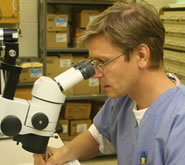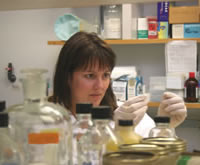Department of AnesthesiologyDonald S. Prough, MD
Professor and
Rebecca Terry White Distinguished Chair
Resident Research Program
 We are within the top ten in the nation among Anesthesiology departments for NIH funding for research. Our residents have consistently won awards for original research presentations at regional and
national meetings.
We are within the top ten in the nation among Anesthesiology departments for NIH funding for research. Our residents have consistently won awards for original research presentations at regional and
national meetings.
The research track in anesthesiology allows for in-depth exposure to academic research and scientific investigation with both clinical and basic science researchers. As such, residents enrolled in this program will have guidance and supervision in areas of scientific research as it relates to the practice of anesthesiology and critical care. The department offers the opportunity to pursue the clinical investigator track approved by the American Board of Anesthesiology. This entails performing full-time research for 6 months during the CA-3 year. Involvement in research projects is also available to residents during the PGY-1 to PGY-3 years. During their research track, residents will have the opportunity to present their research at our Anesthesiology Research Seminars.
Goals and Objectives for Fellows and Residents Pursuing the Research Track
The resident or fellow is expected to achieve the following:
- Develop an understanding of the scientific principles of clinical or laboratory research as they apply to anesthesiology or critical care.
- Learn to read, analyze, and discuss peer-reviewed literature in a specific research area of interest.
- Develop an in-depth understanding of a specific area of anesthesiology or critical care beyond that expected of a general anesthesia practitioner.
- Learn to prepare, submit, and follow research proposals based upon institutional guidelines and policies for human or animal experimentation.
- Complete a focused research project including developing specific aims and hypotheses, acquiring necessary technical skills, generating and collecting data, analyzing data, and writing an abstract (as a minimum) or paper based upon study.
- Prepare and deliver an in-depth oral presentation pertaining to an area of scientific research to a group of physician peers.
Areas of Interest
 The Charles R. Allen Research Laboratories house investigators that focus primarily on traumatic brain
injury. The primary goal of these investigators is to better understand the pathophysiology of traumatic brain injury and to develop treatment to improve outcome for patients suffering this frequently
debilitating and often fatal injury. Overall, the study of central nervous system injury is a major focus of research within the department. Additional studies are being conducted in the area of ischemic
brain injury.
The Charles R. Allen Research Laboratories house investigators that focus primarily on traumatic brain
injury. The primary goal of these investigators is to better understand the pathophysiology of traumatic brain injury and to develop treatment to improve outcome for patients suffering this frequently
debilitating and often fatal injury. Overall, the study of central nervous system injury is a major focus of research within the department. Additional studies are being conducted in the area of ischemic
brain injury.
The Investigational Intensive Care Unit (IICU) is another major hub of research activity. The interests of these labo-ratories are the study of cardiovascular and pulmonary alterations associated with thermal and smoke inhalation injuries. A sheep model of thermal and smoke inhalation injury was developed in the IICU and is well established in this area of research. This large animal model is used in the study of inflammatory and vasoactive mediators and their roles in the pathogenesis of acute lung injury and vascular decompensation following major trauma. In addition, associated research using a mouse model of thermal and smoke inhalation injury has been developed in order to utilize transgenic mouse technology to gain a better understanding of the factors involved in the pathophysiology of critical injury at the cellular and molecular levels.
An additional area of research interest within the department is fluid dynamics and resuscitation. Several investigators are studying the distribution and hemodynamic effects of hypertonic fluids and colloids for resuscitation following major trauma.
Another group in the department is active in the study of sepsis, inflammation and injury-induced immunosuppression. Specific projects range from studying the roles of T and NK cell in the pathogenesis of sepsis to improving antimicrobial immunity through immunomodulatory approaches.
Additional research programs ranging from the study of ischemia-reperfusion injury to the study of pain are active within the department. A brief synopsis of the research activities of active investigators in our department is provided below.
-
Donald S. Prough, M.D., Rebecca Terry White Distinguished Professor and Chairman. Dr. Prough and colleagues are actively investigating
several fac-tors and their role in the pathogenesis of traumatic brain injury.
- Daneshvari R. Solanki, M.D., Professor. Dr. Solanki is studying ischemia-reperfusion injury.
- George C. Kramer, Ph.D., Professor and Director, Resuscitation Research Laboratory. The research performed in the Resuscitation
Research Laboratory primarily involves the study of perioperative fluid therapy and their application to the resuscitation of critically injured patients.
- Douglas S. DeWitt, Ph.D., Professor and Director, Charles R. Allen Research Laboratories. The research in my laboratories focuses on the
study of the effects of traumatic brain injury on the brain and its blood supply and on the effects of secondary insults such as hemorrhagic hypotension on brain func-tion.
- Joachin Cortiella, M.D., Associate Professor. My labs focus is on stem cell therapy for organ regeneration and model system development. We
are also col-laborating with Dr. Prough on the use of peripheral blood stem cells on the treatement of traumatic brain injury.
- Ronald Levy, M.D., Professor. My main research interest is the development of simulator technology as a teaching tool for medical
students and post-graduate physicians.
- Helen Lee Hellmich, Ph.D., Associate Professor. In my laboratory, we investi-gate the molecular mechanisms of neuronal survival and
neuronal cell death af-ter traumatic brain injury.
- Michael P. Kinsky, M.D., Associate Professor and Clinical Director, Resuscitation Research Laboratory. Studies in healthy volunteers
will be performed in an effort to provide mechanistic and clinically relevant insight into the cause of rapid fluid redistribution as well as to demonstrate how beta-adrenergic agents can influence the amount
and duration of vascular volume expansion after a fluid bolus.
- Tracy Toliver-Kinsky, Ph.D., Assistant Professor. The main goals of our re-search are to understand the mechanisms by which severe burn injury
increases susceptibility to infections, and to investigate immunomodulatory strategies that may increase resistance to infections after trauma.